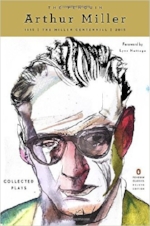The Price (1968)
by Arthur Miller.
A return to form for Arthur Miller. “The Price” is compact in plot, character and time and yet unrelenting dramatically, as is so much of Miller's work. Victor and Esther are a middle-aged couple trying to sell a room packed full with family furniture before Victor's childhood home, a New York brownstone, is knocked down. Victor is a cop who wanted to be a scientist, but chose the steady job to support his emotionally incapacitated father. This room might provide them a financial cushion to help them in a life transition/career change for Victor--that is, if "the price" is right. (I shouldn't overstate that point, because it's not a huge consideration in the plot.) Mr. Solomon, an old Jewish furniture dealer (and a great character!), comes to the house and hems and haws his way to a medium–low offer. Victor accedes, while Esther, a seeming alcoholic, bristles at a husband who can't bargain. The transaction is almost complete when in walks Victor’s estranged brother, Walter, whose presence seems to threaten much more than the sale. Miller always knows where to end an act.
The brothers at first skirt around the issues of their legacy and their father’s deep depression and lack of love or basic human instinct. What's powerful is the ensuing dialectic, the probing search of the two brothers for the truth underneath their lives and their family. Walter abandoned all because he concluded there was no love there, and Victor stayed because someone needed to testify to the possibility of love and care. Or was he just deluded? The good thing is that Miller learned long ago to give all sides in an argument a valid perspective and just enough intelligence and eloquence to almost state it and almost hear the other side.
“You can't walk in with one splash and wash out twenty-eight years. There's a price people pay. I've paid it, it's all gone, I haven't got it anymore. Just like you paid, didn't you?"
With Miller, I often get to a point where I want to stop reading and look away, as if I'm not really wanting to go there with his characters. I don't know if this is a virtue or a vice in his plays. Is this because the drama is truly extraneous to my life, or is my reaction that first layer of resistance to the emotional probing that is essential in the theatrical event? This is actually a crucial question for dramaturgy. Is our art’s obsession with casting audiences into conflict at some kind of odds with the inherent well-being and natural defenses of that audience? Should we trust the instinct to opt out, as one can so easily, say, on Netflix? There is no “yes” or “no” answer here. Certain dramatic experiences are unnecessary, gratuitous, or even harmful. Certain dramatic experiences fit the moment in the life of the individual or the society just right. Certain dramatic experiences are a wash, so to speak. As with taking in food or medicine, we who ingest should be aware of our current condition and capacity. And, as with serving food or prescribing medicine, we who prepare should be aware of the general condition and capacity of those in our care.
DRAMA CIRCLE RATING:
DRAMA CIRCLE RECOMMENDATION:




